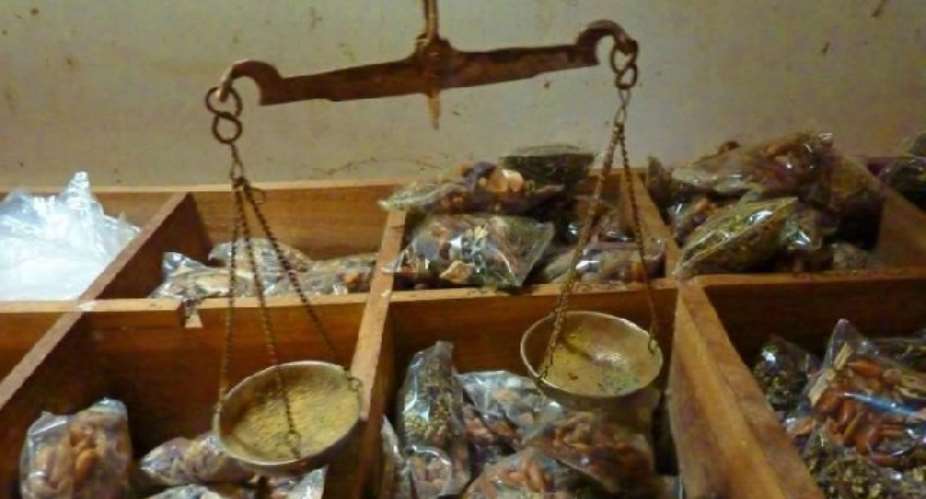Herbal medicine in Ghana is very important to the art of curing diseases using exclusively medicinal plants and herbs. These include tree backs, leaves, flowers, seeds or stem of the plants.
The medicinal plant part is commonly administered in the form of decoction or infusion with hot or cold water. In a few instances, alcohol is used as the vehicle. Sometimes practitioners of herbal medicine administer their portion as tinctures, which may be diluted with water before administration. Such dilutions may result in the precipitation of plant materials such as alkaloids or glycosides which may be the curative constituents of the plant. It is usual for the herbalists or practitioners of herbal medicine to dispense dried or fresh materials to the patients with the direction to make patients' own infusions, decoction for oral administration or be used as an enema. Ointments for topical application are usually prepared by the practitioners and there are however some few problems associated with the practice as follows:
- The ability of the herbal practitioner to identify a plant or herb in the wild
- The efficacy and safety of the herbal preparation administered for a particular ailment and many other things.
Herbal medicine provides hundreds of remedies for treating a variety of health problems and illnesses. In today's world, there is a growing interest in holistic health, and more people are learning about the ancient applications of botanic medicine to prevent illness, treat specific ailments, and preserve overall health. Herbal medicine is a natural choice for everyone, especially Africans and Ghanaians.
The herbal medicine had background information on current products at the Centre for Plant Medicine Research (CPMR) in Mampong Akuapem, Eastern Region of Ghana, and also qualitative research information of their core mandates to gain the highest recognition for research and development of herbal products that meet the existing needs of both patients and industry through innovative, scientific investigation and productive partnership.
As a result, herbal medicine is currently used in a more scientific manner than in earlier years. Herbal medicine is here to stay, and I encourage everyone to utilize it as a meal and a companion when issues arise. In fact, the World Health Organization (WHO) has long believed in herbal medicine, and the perfect location to go for herbal consultation is Centre for Plant Medicine Research (CPMR).
In the actual facts of the herbal medicine syndrome, all herbalists and their respective associations should indeed group together as one body to achieve complete in examining their products at CPMR, which they are selling on the market, to ensure that they are effective and efficacy tests before being consumed by individuals. Stakeholders may also require additional training at CPMR on how herbalists might redesign and brand their products in a healthier manner in the Global World Market (GWM). Through research and other clinical trials, herbal medicine can treat and solve Ghanaians' problems in this COVID-19 era.
Furthermore, all stakeholders must work together to educate people about the benefits of herbal medicine and its role in social and economic development. Croton Membranaceus for men's prostate disorder helps to flow urine when the track is blocked. Herbal medicine of NIBIMA in its botanical name cryptolepis sanguinolenta is a very good medicine for malaria, and Lippia multiflora for depression and many other stresses allows you to have a good rest, and last but not the least, Croton Membranaceus for men's prostate disorder allows you to have a good rest. All of these medicines aid a lot by functioning well in our bodies, particularly dyspepsia for stomach trouble. In fact, the CPMR has a superb herbal medicine that works really successfully and swiftly. Come celebrate and support CPMR's efforts at the world's highest middle-income institution.
Written and compiled by Samuel T Okae
Alumni of Ghana Institute of Journalism and Administrative Officer at the CENTRE FOR PLANT MEDICINE RESEARCH, MAMPONG-AKUAPEM, GHANA





 Meta releases new version of conversational AI across its platforms
Meta releases new version of conversational AI across its platforms
 Cape Town named Africa’s Best Airport 2024 by Skytrax
Cape Town named Africa’s Best Airport 2024 by Skytrax
 Bono East: Four injured after hearse transporting corpse crashes into a truck
Bono East: Four injured after hearse transporting corpse crashes into a truck
 ‘Be courageous, find your voice to defend our democracy’ — Sam Jonah urges journ...
‘Be courageous, find your voice to defend our democracy’ — Sam Jonah urges journ...
 Exodus of doctors, nurses and teachers have worsened because of unserious Akufo-...
Exodus of doctors, nurses and teachers have worsened because of unserious Akufo-...
 2024 election: Avoid insults, cutting down people in search of power – National ...
2024 election: Avoid insults, cutting down people in search of power – National ...
 ‘You passed through the back door but congratulations’ — Atubiga on Prof Jane Na...
‘You passed through the back door but congratulations’ — Atubiga on Prof Jane Na...
 Government’s $21.1 billion added to the stock of public debt has been spent judi...
Government’s $21.1 billion added to the stock of public debt has been spent judi...
 Akufo-Addo will soon relocate Mahama’s Ridge Hospital to Kumasi for recommission...
Akufo-Addo will soon relocate Mahama’s Ridge Hospital to Kumasi for recommission...
 We must not compromise on our defence of national interest; this is the time to ...
We must not compromise on our defence of national interest; this is the time to ...
